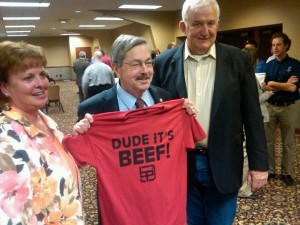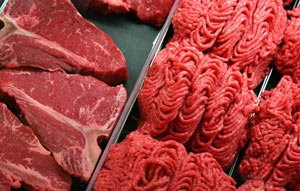The federal system designed to keep Canadian food safe to eat failed in December to prevent ground beef contaminated with E. coli from being offered for sale to consumers.
 CBC News reports that the Canadian Food Inspection Agency’s December recall of 31,000 pounds of ground beef followed a positive test of a random sample by a federally-co-ordinated public health surveillance program, CBC News has learned. It was not a result of any inspection work performed by the CFIA, whose job it is to prevent tainted meat from entering the marketplace.
CBC News reports that the Canadian Food Inspection Agency’s December recall of 31,000 pounds of ground beef followed a positive test of a random sample by a federally-co-ordinated public health surveillance program, CBC News has learned. It was not a result of any inspection work performed by the CFIA, whose job it is to prevent tainted meat from entering the marketplace.
The recall also was not widely publicized until the morning of Dec. 2 — three or four days after the “use by” dates of the packaged meat had passed.
That timeline suggests the entire food safety system managed by CFIA failed to either detect E. coli-tainted meat in a federally regulated processing facility or recall the problem batch until after any of the fresh meat had likely been consumed or thrown out.
The details of the recall prompted an angry reaction from NDP agriculture critic Malcolm Allen.
“That’s not a safety inspection system, that’s actually just a failure,” he said. “If by the time they actually make a recall, it’s days after the best before date, there’s nothing on the shelf to recall.
“It’s either been bought, in people’s freezers, been consumed, or the retailer themselves removed it — not because they knew it was unsafe but because the best before date expired and they took it off the shelf themselves.”
The meat was shipped by Cargill Meat Solutions from its Calgary processing plant to Walmart stores across the four Western provinces on Nov. 19 and 20.
That facility is federally inspected, but the systems in place there apparently did not detect any E. coli.
 In a statement, Cargill said it maintained a “robust food safety program.”
In a statement, Cargill said it maintained a “robust food safety program.”
“We are currently reviewing our processing and testing procedures as part of our investigation to determine if any changes are appropriate,” the statement said.
The CFIA says its investigation is ongoing. It said it was impossible to predict how long that work will take.
“We are taking all necessary steps in order to protect Canadians from the risks posed by E. coli,” the agency offered in a statement.
But those steps appear, in this case, to have not yielded effective results.
Rather, it was the work of FoodNet Canada that revealed some of Cargill’s meat had been contaminated.
The little known organization is a federally-run public health program that performs surveillance for infectious enteric disease caused by bacteria, viruses or other parasitic micro-organism such as E. coli.
It does the work in three so-called “sentinel sites” in Canada, including B.C.’s lower mainland, where it monitors public health, samples water and tests manure from farms where animals are raised for human consumption.
FoodNet also collects random samples of meat and produce from grocery stores, says Dr. Frank Pollari, the program’s manager.
“We’re just trying to see what the end product looks like, what the consumer is getting,” he said. “We randomly select the retailers, and then [staff] go out to those and select the specific package that we get, and they ship it to our labs.”
Recall 3 days after meat tested positive
Pollari says it was one of those samples of Cargill meat from a B.C. Walmart that first tested positive for E. coli.
That early result was sent to the CFIA on Nov. 28.
That was the first of two consecutive “use by” dates with which the meat had been labelled.
CFIA says it began an investigation immediately. But, the meat was not ordered recalled until after confirmatory test results were known on Dec. 1.
Then the agency asked for a risk assessment to be performed. The results of that analysis came back late on Dec. 1.
The news release announcing the recall to consumers was dated that same day, but was not sent out by distribution services until the next morning — three full days after the first packages of meat would have begun to pass their best before dates.
In a statement Sunday, CFIA media relations manager Guy Gravelle suggested the recall was the result of a normal process.
 “As a result of the federal system and measures we have in place, the CFIA was able to recall these products based on routine retail sampling,” Gravelle wrote in an e-mail.
“As a result of the federal system and measures we have in place, the CFIA was able to recall these products based on routine retail sampling,” Gravelle wrote in an e-mail.
“This food recall was made before any reported illnesses and to date there have been no illnesses.”
But FoodNet, which found the bad meat, is not technically part of the food safety system.
It is an adjunct — a surveillance program, designed to provide scientific data and public health information to the government and to the food sector.
“Our job is to feed the information back to those who can and do make the difference in putting in interventions,” Pollari said.
Federal Health Minister Rona Ambrose is responsible for the CFIA, and, ultimately, for FoodNet Canada, as well.
In a statement, her office said, “Canada has one of the safest and healthiest food systems in the world.”
Uh –huh.
